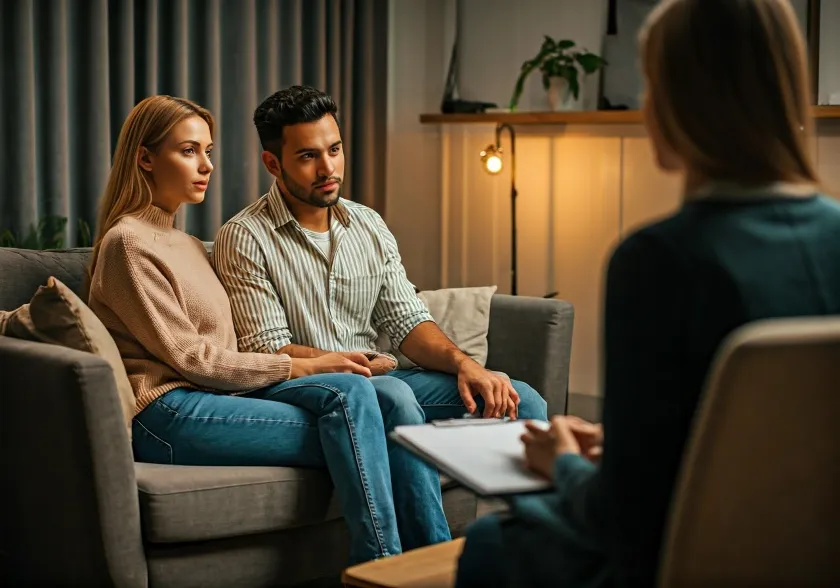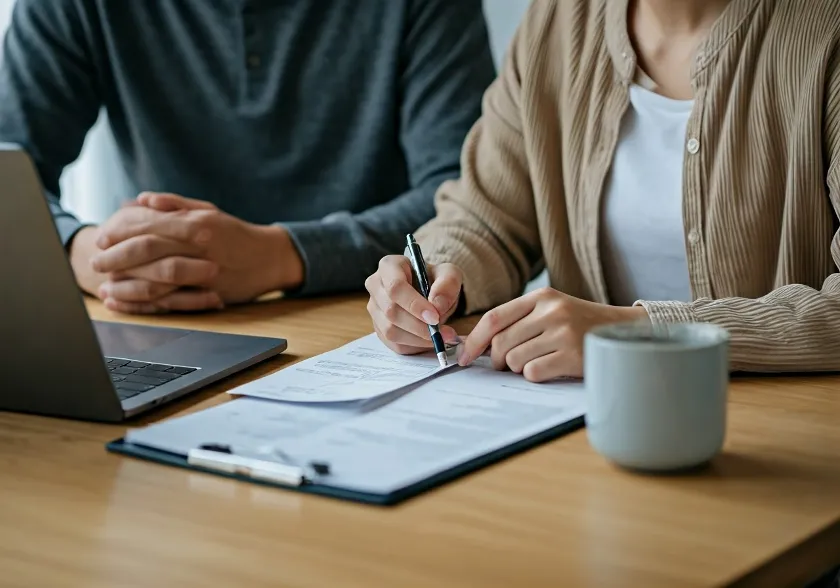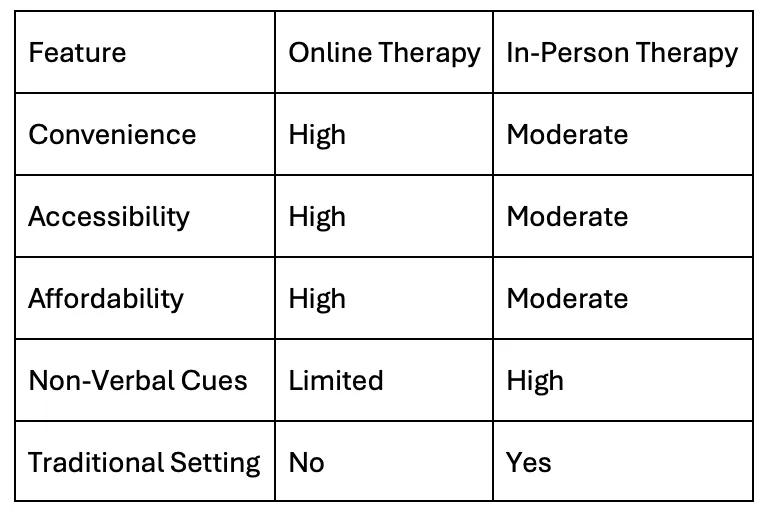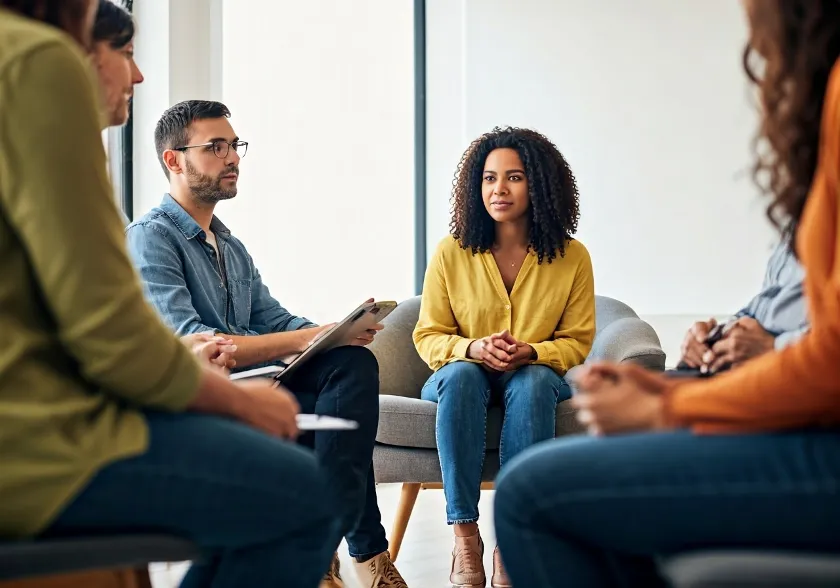Navigating relationships can be hard. Asking for help shows strength, not weakness. A good relationship needs open talk, respect, and a desire to grow together. Yet, stress and unexpected events can cause problems that feel tough to handle alone. It's important to focus on your mental health. Seeking help through relationship counseling can give you great tools and methods to build a stronger and more satisfying partnership.

Relationship counseling, also known as couples therapy, provides a safe and caring space for couples to work through their problems and improve their romantic relationships. It helps to find and understand the deep-rooted relationship issues that can lead to arguments, poor communication, and feeling distant from each other.
Whether you are dating, engaged, or married, couples therapy helps you build better ways to communicate. It can also boost your emotional intimacy and help you handle life changes together, making you stronger and more understanding of each other.
Even healthy relationships can gain from counseling to prevent problems. Similar to regular health checkups, relationship counseling gives couples a safe space. Here, they can work on their bond and tackle issues before they get bigger.
A family therapist helps couples learn key relationship skills. These include clear communication, resolving conflicts, and building intimacy, which may be enhanced through certification in relevant techniques. They also provide insights into family dynamics and attachment styles. Understanding triggers that may affect the relationship is important too.
By learning more about each other's needs, expectations, and ways of communicating, couples can create a strong foundation. This helps in building a lasting and enjoyable relationship.
Relationships often change as we go through different life events. Couples counseling offers a chance to look at and change these relationships. This helps make sure they stay healthy and satisfying for both partners.
In relationship therapy, partners can gain clear insight into their roles and what they expect from each other by engaging in the rituals of connection. They can discuss how their past experiences, attachment styles, and ways of communicating affect their relationship now.
By building self-awareness and empathy, couples counseling helps individuals promote positive changes in how they interact. This leads to a stronger bond, better intimacy, and a more peaceful relationship.
Seeing the signs that you need relationship counseling is important. It can help you fix problems before they get worse. Every couple has issues, but if you notice ongoing negativity, poor communication, or feeling distant, you might need an expert's help.
If you and your partner often have hurtful fights, find it hard to talk to each other, or have trust problems, think about reaching out to a qualified relationship therapist.
Recurring conflicts and unproductive arguments show there are deeper relationship issues to deal with. Disagreements are normal in any relationship. However, constant fighting can create a toxic environment and damage trust and intimacy.
Couples therapy gives couples a safe space to express their needs and views in a healthy way. With guided exercises and communication techniques, they can share their feelings, recognize each other's triggers, and find peaceful ways to solve conflicts.
By tackling emotional pain, mental health concerns, and unresolved problems, couples therapy helps people leave behind unhealthy ways of communicating. This can lead to a happier and healthier relationship.
Effective communication is vital for any relationship to be successful. When communication fails, it can cause misunderstandings and hurt feelings. This leads to emotional distance, making relationship problems even worse.
Couples therapy gives partners the tools they need to communicate well and fix their misunderstandings. In therapy, couples practice active listening. This helps them to hear and understand each other's views, which builds empathy and compassion.
Creating a safe and open space for honest talks is a key part of couples therapy. This reduces communication barriers and helps partners connect more deeply. It promotes intimacy and leads to a more satisfying relationship.
Feeling emotionally distant or disconnected from your partner is a big warning sign. If you feel like you are just roommates or strangers, it shows there are deep issues in your relationship that you need to work on.
Couples counseling can be very helpful to fix emotional gaps. Individual counseling is also important to heal personal wounds and to grow self-awareness.
By dealing with personal issues, past traumas, or mental health concerns, individual counseling can help people be more present in their relationships. This can lead to a deeper connection, more intimacy, and a happier partnership.
Trust is a key part of every strong and healthy relationship. When trust is lost due to cheating, lies, or broken promises, it can be hard to repair.
Couples counseling offers a safe place for partners dealing with trust issues and infidelity. In this space, they can talk about their feelings, learn why the betrayal happened, and figure out what to do next.
Through special activities and communication methods, couples counseling helps build forgiveness, empathy, and trust again. It allows couples to deal with their relationship issues and create ways to heal and move on, whether as a team or on their own.

External stressors, like money problems, losing a job, or family arguments, can place great pressure on even the strongest relationships. These issues can lead to more arguments, poor communication, and distance between people. This can create feelings of anger and frustration.
A family therapist can support couples during these tough times. They offer helpful strategies to manage stress, improve communication, and focus on self-care.
Financial problems are one of the top reasons people feel stressed in their relationships. Differences in spending habits, medical issues, how much money each person makes, or sudden economic issues can hurt a couple's communication, intimacy, and overall happiness.
Relationship counseling can help couples learn to communicate better about money. It offers a safe space where they can talk about financial goals, worries, and personal spending habits without fear of judgement.
By setting shared financial goals, making a realistic budget together, and looking for alternative solutions, couples can face financial issues together. This can build trust, transparency, and lead to a stronger, healthier relationship.
Navigating family relationships is often tricky, especially with in-laws. Different values, expectations, and ways of talking can change how couples interact. This can cause stress, hard feelings, and arguments.
Family therapy can help couples deal with in-law challenges. A therapist who is neutral and experienced can help improve communication, set boundaries, and bridge cultural gaps. This promotes understanding and respect.
When couples work on communication, set clear expectations, and create healthy boundaries, they can reduce stress and conflict from in-law relationships. This leads to a happier and more supportive family environment.
Finding the right couples therapist is very important for a good experience. Luckily, Houston, TX, has many choices for counseling. You can find traditional in-person sessions or the new option of online therapy that includes video sessions.
Whether you want online couples counseling or prefer meeting in person, it's key to pick a licensed therapist who also offers online relationship counseling. Make sure they have experience with relationship issues. They should also have a style that fits your needs and goals.
Embarking on couples therapy is an important step for healing and growth. It is crucial to find a counselor who matches your values and communication styles. This will help make your experience successful and rewarding.
Start by looking for therapists who focus on relationship counseling. Think about their methods, like the Gottman Method or Emotionally Focused Therapy. It's a good idea to set up an initial consultation. This will help you feel comfortable and see if they are a good match for you.
During the consultation, talk about your expectations, concerns, and any specific relationship issues you face. A capable couples therapist will ask you and your partner questions, providing a safe space. Both partners should feel heard, understood, and respected throughout the process.
Deciding between online therapy and in-person counseling depends on your individual needs, preferences, lifestyle, and the type of therapy you choose. Both options offer unique advantages, and choosing the right fit can significantly impact your therapy experience.
Online therapy provides unparalleled convenience, accessibility, and affordability, eliminating geographical barriers and accommodating busy schedules. In-person therapy allows for face-to-face interactions, non-verbal cues, and a more traditional therapeutic setting, which some individuals find comforting and beneficial.

Ultimately, choosing the right modality for your couples therapy session depends on your comfort level, preferences, and the specific challenges you are facing.
Preparing for your first counseling session can help reduce fear and make it easier to have a good experience. It’s normal to feel nervous, hopeful, or worried. It’s important to accept and talk about these feelings.
Before you go to the first session, talk with your partner about what you both expect. Identify the relationship issues you want to work on together. Keep in mind that therapy works best when both people take part. This active involvement is key for creating real change.
Approaching couples therapy with realistic expectations is very important. It's not a quick fix or a sure solution. Instead, it is a journey that needs patience, commitment, and a real wish to grow from both people involved.
You should know that couples therapy, like other types of therapy, can bring up tough emotions, remind you of past hurts, or make you question long-held beliefs. It involves exploring, understanding, and changing unhealthy ways of communicating and dealing with problems in the relationship.
To get the most out of couples therapy, set clear and reachable relationship goals. See challenges as chances to grow. Keep communication open with your therapist. This way, you can truly benefit from the power of couples therapy.
Embracing change and growth is important for happiness in both people and their relationships. Relationship counseling offers a safe place where you can challenge negative thoughts, learn healthy ways to cope, and build a stronger partnership.
Change can be scary, and it's normal to resist it. Individual therapy can also help alongside couples counseling. This space allows you to look at your personal challenges, deal with past issues, and understand yourself better. This self-awareness helps you be your best in your relationships.
By being open, communicating clearly, and being active in therapy, people can handle problems in their lives and relationships better. This leads to real change, growth, and a more satisfying life.

Getting help for relationship issues shows strength, not weakness. Sadly, there is still stigma around couples therapy and mental health. This stops many people from getting the help they need.
By sharing our stories, correcting misunderstandings, and making it normal to ask for help, we can help build a society that values mental well-being and offers support to everyone.
Dispelling myths about couples therapy is very important. It helps more people get the support they need without feeling bad about it. Therapy is not about blaming anyone. It does not focus on making one person “right” or “wrong,” and it does not force couples to stay together.
For instance, premarital counseling does not mean there are relationship problems. It is a type of relationship therapy that helps to build a strong foundation for a healthy partnership. It helps couples learn good communication skills, share expectations, and solve potential issues before they become big problems.
The Gottman method is another well-known way to approach couple therapy. It does not aim to remove all conflict. Instead, it shows couples how to turn conflict into chances for growth and better understanding. It gives them tools to talk effectively, manage disagreements in a positive way, and strengthen their emotional bonds.
Approaching your partner about relationship therapy is important. You need to be sensitive, caring, and open. Set a timer and pick a time when both of you feel calm and relaxed. This way, you can have a warm conversation.
Start by telling your partner how much you love and care about your relationship. Let them know you want to make your bond stronger by watching your favorite movie together and solving any problems together. Use "I" statements to share your feelings and needs. This helps avoid blame and accusations.
Suggest relationship therapy as a safe place to work on your challenges together. A neutral professional can help guide you. Remind your partner that seeking therapy shows strength, not weakness. This shows your commitment to building a happier and healthier relationship.
Couples therapy can change lives. Many success stories show how it helps rebuild trust, spark intimacy, and create stronger connections. These stories give hope. They prove that many tough challenges can be handled with the right help and dedication.
Couples who choose therapy often feel more connected. They communicate better and handle conflicts more positively. After therapy, they report feeling a fresh sense of intimacy, passion, and happiness in their relationship, making therapy a great option for improving their bond.
Rebuilding trust and closeness after betrayal, lies, or a serious breach of trust can be tough. However, it can also be very rewarding. Relationship counseling can offer a safe and helpful space for couples to work through these difficult times. It provides tools and ideas to help them heal and grow together.
Through guided activities and communication methods, couples can learn to talk about their hurt, anger, and feelings in healthy ways. This helps to build empathy, understanding, and forgiveness.
Getting back intimacy takes time and effort from both partners. It means finding that emotional bond again, sparking the passion, and making quality time together a priority. With commitment, open talks, and help from a skilled therapist, couples can work past the pain of betrayal and create a stronger, happier relationship.
Couples counseling teaches people important communication skills that are useful beyond therapy. These skills help in all parts of life, making relationships with partners, family, friends, and coworkers better, especially in the absence of distractions.
Active listening is one key skill. It means really hearing what the other person is saying, both in words and body language. This helps to understand each other, build empathy, and cut down on confusion. Using "I" statements helps people share their feelings and needs without blaming others. This way, it creates a safer space for open talk.
When couples use these communication skills in their daily lives, they can avoid misunderstandings. They can handle conflicts better and build stronger connections with others.
Relationship counseling can help couples who are having problems. It is a brave choice to seek support when facing communication issues or trust problems. Whether you choose online sessions or meet in person, the goal remains the same. You will work to rebuild trust, improve intimacy, and develop better communication skills. Keep in mind that it is perfectly fine to ask for help. In Houston, TX, there are many counseling choices to assist you and your partner in creating a more satisfying relationship. Don't let any negative feelings stop you; take the chance to grow and improve together. Begin your path to a stronger relationship today.
The best time for relationship counseling is when problems or poor communication start to impact your daily life and feelings. Seeing a clinical psychologist or couples therapist early can stop these issues from getting worse.
Individual counseling can really help a relationship. It gives people a chance to deal with their personal issues. They can also work through past experiences with mental health professionals. This process helps them grow as individuals. In turn, it helps build better connections in the partnership, following attachment theory.
The length of couples counseling can be different for each couple. It depends on how complicated your relationship goals are, your mental health background, and the progress you make in therapy. Some couples show big improvements in just a few months. Others might need therapy for a longer time to see results.
Insurance coverage for couples therapy in Texas can change based on your insurance provider, such as Aetna, and your policy. It's best to call your insurance company. Ask them about your benefits and if they cover couples therapy with a licensed therapist.
Stay informed about the latest research in psychology.
.png)
Explore how Internal Family Systems (IFS) therapy heals trauma and restores self-leadership.
.png)
Explore how Internal Family Systems (IFS) therapy heals trauma, anxiety, and inner conflict.
.png)
A practical guide to recognizing, preventing, and healing teacher burnout in Houston schools.